|
|
| Sei in: Cinema e Medioevo ® Indice alfabetico dei film |
ANDREJ RUBLEV
(Andrei Rublyov)
1969, regia di Andrej Tarkovsky
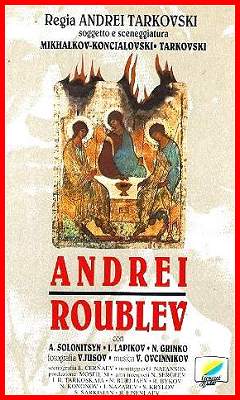
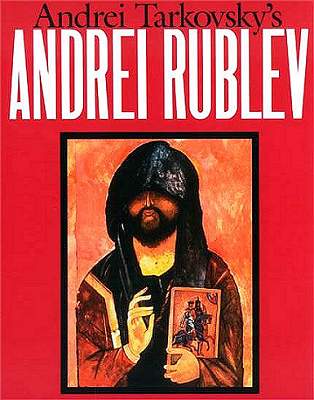
Scheda: Nazione: URSS - Produzione: Mosfilm - Distribuzione: Ceiad, General Video, San Paolo Audiovisivi, Columbia Pictures, Empresa Hispanoamericana de Video, Sovexportfilm - Soggetto: Andrei Konchalovsky, Andrei Tarkovsky - Sceneggiatura: Andrei Konchalovsky, Andrei Tarkovsky - Fotografia: Vadim Yusov - Montaggio: Lyudmila Feiginova, O. Shevkunenko, Tatyana Yegorycheva - Costumi: Maya Abar-Baranovskaya, Lidiya Novi - Musiche: Vyacheslav Ovchinnikov - Effetti speciali: Pavel Safonov - Formato: Cinemascope B.N. e color (Sovcolor) - Durata: 190' (145', 205').
Cast: Anatoli Solonitsyn, Ivan Lapikov, Nikolai Grinko, Nikolai Sergeyev, Irma Raush, Nikolai Burlyayev, Yuri Nazarov, Yuri Nikulin, Rolan Bykov, Nikolai Grabbe, Mikhail Kononov, Stepan Krylov, Irina Miroshnichenko, Bolot Bejshenaliyev, K. Aleksandrov, E. Borisovsky, Igor Donskoy, Nikolai Glazkov, Vladimir Guskov, Nikolai Kutuzov.
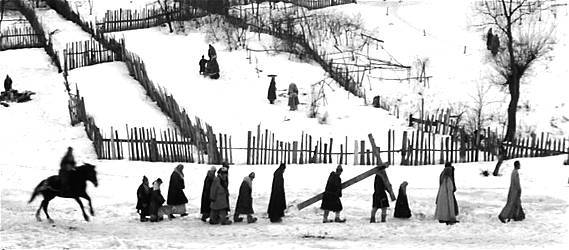
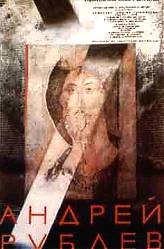
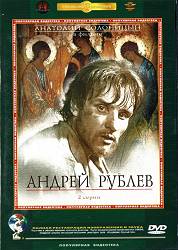
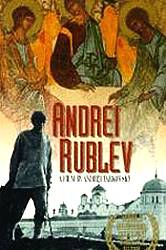
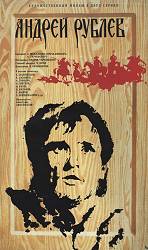
![]() clicca
sulle immagini in basso per ingrandirle
clicca
sulle immagini in basso per ingrandirle
![]() Trama e commenti: cinematografo.it
-
mymovies.it - film.spettacolo.virgilio.it - activitaly.it - filmscoop.it - cinekolossal.com - dvdoasi.it - kataweb.it: «In una Russia messa a ferro e fuoco dalle invasioni asiatiche e sconvolta dalle lotte di potere tra piccoli potentati, il monaco Rublev (1360 ca.-1430), pittore di icone, passa attraverso 9 capitoli (Il volo, Il buffone, Teofane il Greco, La passione secondo Andrej, La festa, Il giudizio universale, La scorreria, Il silenzio, La campana) che compongono un vasto affresco del Medioevo russo. Nel
primo è assente, in altri fa da spettatore o "passeggero", nell'ultimo una delle più alte pagine filmiche di epica del lavoro umano è in disparte, testimone silenzioso. E uno dei grandi film degli anni '60 (bloccato per 6 anni dalla censura sovietica e distribuito in Italia solo nel 1975) il capolavoro di Tarkovskij è il più maturo risultato, in campo cinematografico, della cultura del dissenso nell'URSS. Epilogo a colori, 10 minuti di documentario sulla pittura di Rublev: l'autore scompare, rimane l'opera».
Trama e commenti: cinematografo.it
-
mymovies.it - film.spettacolo.virgilio.it - activitaly.it - filmscoop.it - cinekolossal.com - dvdoasi.it - kataweb.it: «In una Russia messa a ferro e fuoco dalle invasioni asiatiche e sconvolta dalle lotte di potere tra piccoli potentati, il monaco Rublev (1360 ca.-1430), pittore di icone, passa attraverso 9 capitoli (Il volo, Il buffone, Teofane il Greco, La passione secondo Andrej, La festa, Il giudizio universale, La scorreria, Il silenzio, La campana) che compongono un vasto affresco del Medioevo russo. Nel
primo è assente, in altri fa da spettatore o "passeggero", nell'ultimo una delle più alte pagine filmiche di epica del lavoro umano è in disparte, testimone silenzioso. E uno dei grandi film degli anni '60 (bloccato per 6 anni dalla censura sovietica e distribuito in Italia solo nel 1975) il capolavoro di Tarkovskij è il più maturo risultato, in campo cinematografico, della cultura del dissenso nell'URSS. Epilogo a colori, 10 minuti di documentario sulla pittura di Rublev: l'autore scompare, rimane l'opera».
![]() Plot Summary, Synopsis, Review: IMDb - entertainment.msn.com - tvguide.com -
ruscico.com -
video.barnesandnoble.com - cinephare.com - volovik.com - showtimedvd.biz - tarcovsky.ru - en.wikipedia.org:
«Andrei Rublev was not intended to be directly biographical; little is known about Andrei Rublev and several historical facts were changed for the movie. Andrei is rather an observer who looks on upon the events in the movie, especially evident in the sequences centered on the casting of the bell towards the end of the movie, where Andrei plays the role of observer and is not central to the
scenes. Details of everyday medieval life are conveyed mainly through naturalistic and lyrical images, not exposition. The film is well-researched not in terms of specific events but in terms of general lifestyle and
customs. Appropriately for a medieval setting, religion takes center stage, and references to the Bible abound, as it was the primary text known to the population. There is a complex outlook on Christianity and the Church - both positive and negative aspects are perceived by the characters and
discussed. The spoken language is natural, not artificial or “scripted” – it is crude and primitive. Although not ancient Russian, it is mostly authentic (some of the words, however, are anachronistic and have European roots: “interesno”, “forma”,
“sekret”). All foreign languages (Mongol, Italian) are spoken in the original. Tarkovsky’s love of the Renaissance and Italy gets a tongue-in-cheek reference with the presence of “Italian Ambassadors” in the climactic scene.
... Many varied shots, including overhead crane shots are used. Long, fluid takes are favored over quick cuts. Fantasy sequences (of two different characters) and flashbacks are also used. Sequences are extended to allow viewer
reflection...».
Plot Summary, Synopsis, Review: IMDb - entertainment.msn.com - tvguide.com -
ruscico.com -
video.barnesandnoble.com - cinephare.com - volovik.com - showtimedvd.biz - tarcovsky.ru - en.wikipedia.org:
«Andrei Rublev was not intended to be directly biographical; little is known about Andrei Rublev and several historical facts were changed for the movie. Andrei is rather an observer who looks on upon the events in the movie, especially evident in the sequences centered on the casting of the bell towards the end of the movie, where Andrei plays the role of observer and is not central to the
scenes. Details of everyday medieval life are conveyed mainly through naturalistic and lyrical images, not exposition. The film is well-researched not in terms of specific events but in terms of general lifestyle and
customs. Appropriately for a medieval setting, religion takes center stage, and references to the Bible abound, as it was the primary text known to the population. There is a complex outlook on Christianity and the Church - both positive and negative aspects are perceived by the characters and
discussed. The spoken language is natural, not artificial or “scripted” – it is crude and primitive. Although not ancient Russian, it is mostly authentic (some of the words, however, are anachronistic and have European roots: “interesno”, “forma”,
“sekret”). All foreign languages (Mongol, Italian) are spoken in the original. Tarkovsky’s love of the Renaissance and Italy gets a tongue-in-cheek reference with the presence of “Italian Ambassadors” in the climactic scene.
... Many varied shots, including overhead crane shots are used. Long, fluid takes are favored over quick cuts. Fantasy sequences (of two different characters) and flashbacks are also used. Sequences are extended to allow viewer
reflection...».
![]() Approfondimenti: Movie
Review
Approfondimenti: Movie
Review
Conosciuto anche con i titoli: The Passion According to Saint Andrew; Strasti po Andreiu.